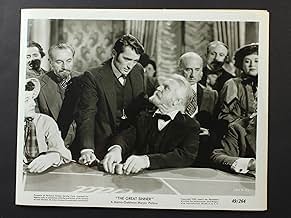Un écrivain devient un joueur compulsif lorsqu'il fait de la recherche sur le sujet. Perdant toutes ses richesses, ainsi que sa fibre morale, il commet la dégradation ultime de voler une pau... Tout lireUn écrivain devient un joueur compulsif lorsqu'il fait de la recherche sur le sujet. Perdant toutes ses richesses, ainsi que sa fibre morale, il commet la dégradation ultime de voler une pauvre boîte d'église afin de nourrir sa compulsion.Un écrivain devient un joueur compulsif lorsqu'il fait de la recherche sur le sujet. Perdant toutes ses richesses, ainsi que sa fibre morale, il commet la dégradation ultime de voler une pauvre boîte d'église afin de nourrir sa compulsion.
- Réalisation
- Scénario
- Casting principal
- Secretary
- (as Frederick Ledebur)
- Hotel Manager
- (as Ludwig Stossel)
- Valet
- (as Erno Verebes)
- Gambling Casino Patron
- (non crédité)
- Nervous Young Gambler
- (non crédité)
- Croupier
- (non crédité)
- Staring Casino Patron
- (non crédité)
- Gambling Casino Accountant
- (non crédité)
- Female Fountain Attendant
- (non crédité)
Avis à la une
Which left Gregory Peck who was apparently a second choice to play the Russian writer who stops off at the gambling resort of Wiesbaden in the 1860s just before German unification. He's on his way to Paris, but one sight of Ava Gardner getting off at Wiesbaden, makes Peck decide to abruptly change his plans.
As for Ava, certainly one can understand that she's beautiful enough to let one's hormones take over, but I got the feeling Ava just wasn't into the part really, as Greg was also not. It's also hard to believe that Walter Huston had won an Oscar for his previous film, The Treasure of the Sierra Madre. To overcome a trite story, Huston overacts outrageously, pulling everything out of a ham's bag of tricks.
Even Melvyn Douglas as the scheming casino owner takes his nineteenth century villainy from the Snidely Whiplash tradition. Agnes Moorehead as the old crone of a pawnbroker also indulges in some scenery chewing, her best example of that since Dark Passage.
Best in the film in my humble opinion is Frank Morgan as the former mathematics professor and now addicted gambler. He brings a real aura of tragedy to his small role.
The Great Sinner is a sluggishly paced film with a lot of very talented people just going through the motions. For a gambling story, I'll take Casino.
Don't believe me, Wanna bet?
I prefer to look at this movie like a "Shakespeare in Love" for Dostoevsky. It has so many little hints about his faith, seizures, and influences on his books. A fan of all his works will catch the obvious inferences (like the ax and the pawn shop, and the scenes straight out of the Gambler). But there are a lot of subtle references to the Idiot and the Brothers Karamizov. The title "The Great Sinner" is a reference to Dostoevsky's planned final works (which included the Bros. K.) but he was unable to finish it. Anyone who is put off by the "heavy handed" religious message of the film obviously has no idea how religious Dostoevsky was. His books are full of redemption by Christ. I think this movie was great. Peck played the part very well. He wasn't supposed to be Alexi from the novel, he is the author. The gambling scenes are intense enough to turn your stomach.
Le saviez-vous
- AnecdotesDeborah Kerr was initially scheduled to co-star with Gregory Peck. Then Lana Turner was slotted for the role, and then withdrawn from the production due to her extended European honeymoon with Henry J. Topping, Jr. Finally, Ava Gardner was cast in what turned out to be the first of three films to co-star the pair, along with Les Neiges du Kilimandjaro (1952) and Le Dernier Rivage (1959).
- GaffesOn numerous occasions during the long Roulette game when the "No more bets" call is made, the wheel is shown to be turning pretty slowly; yet immediately afterwards as the ball is getting ready to drop into the slot, the wheel is suddenly turning much more rapidly.
- Citations
Pauline Ostrovsky: Oh, you can count on my vanity. No matter what you say I'll regard it as a compliment.
Fedja: All right, if you insist. To one of the most corrupt women I've ever met.
Pauline Ostrovsky: Corrupt?
Fedja: Corrupt, confused, frustrated, and empty.
Pauline Ostrovsky: But in a charming sort of way, you'll admit.
Fedja: Well charm, my dear is your gambling capital. You toss it on the table like money, like everything else, even a dying grandmother.
Pauline Ostrovsky: When a man takes the trouble to be so rude to a woman, he is usually falling in love with her.
Fedja: You're not a woman. You are a symptom.
Pauline Ostrovsky: Of what?
Fedja: Of one of the worlds deadliest diseases, sophistication. More champagne?
Pauline Ostrovsky: What else am I?
Fedja: You are irritatingly beautiful.
Pauline Ostrovsky: Well, at last!
Fedja: And everything, I reject.
- ConnexionsEdited into Hollywood: The Dream Factory (1972)
Meilleurs choix
- How long is The Great Sinner?Alimenté par Alexa
Détails
Box-office
- Budget
- 2 075 000 $US (estimé)
- Durée1 heure 50 minutes
- Couleur
- Rapport de forme
- 1.37 : 1
Contribuer à cette page





































